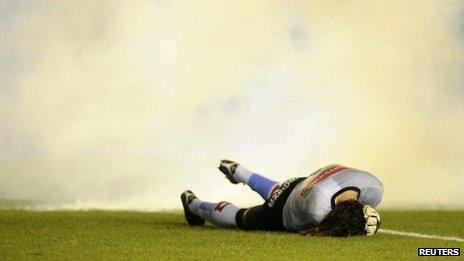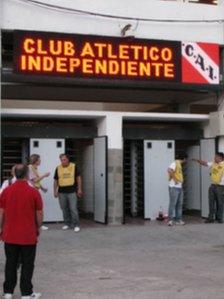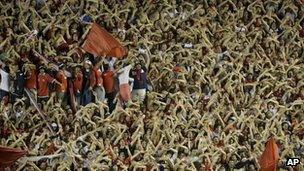The woman trying to tackle Argentine football violence
- Published

Violence led to an Independiente match being stopped in November
The day I met Florencia Arietto, there were flags outside her workplace calling for her resignation, and she was being escorted by a police officer after receiving yet another death threat.
Ms Arietto has no ordinary job. She is the first woman working as chief of security at a football club in Argentina.
Employed by Athletic Club Independiente, her main task is to kick out violence from the game, an endemic problem in Argentina.
In the last 10 years, at least 66 people have died in football-related violence in Argentina, according to the NGO Let's Save Football.
Almost every weekend there is violence at Argentine football grounds.

Florencia Arietto is not underestimating the scale of her challenge
The culprits are the so-called Barras Bravas, gangs of radical supporters who control the terraces and the streets around the stadiums, where they charge fans for parking.
Sometimes there are clashes between rival factions of supporters, before or after the match.
Other times, violence breaks out on the stands, the result of internal disputes for the control of the Barra, and the money that goes with it.
These gangs also demand money from players and clubs in exchange for their support. Independiente says $35,000 (£22,000) a month was being extorted from the club.
In some cases these gangs are - or have been - supported by football clubs' managements, and at times some have had links to the highest echelons of Argentine politics.
But this year, a new administration took over at Independiente, one of Argentina's biggest clubs, led by Javier Cantero.
Elected president by club members, Mr Cantero promised to end any ties with people who controlled the Barra.
Mr Cantero felt the backlash almost immediately.
And this is where Ms Arietto came in.
'Thugs'
"Last May, after Mr Cantero said he would cut financial support from the club to the Barra, some 30 people burst into his office and verbally threatened him," said Ms Arietto.

The club faces a big task in tackling hooliganism
"I thought that what had happened was unacceptable, so I contacted Mr Cantero to offer to help in any way I could to kick these violent people out."
This led to the trained lawyer being taken on at the club in September in time for the start of the new season.
"The good thing about being a woman is that nobody can come and pick up a fight with me," said Ms Arietto, half-jokingly.
One of her first steps was to ban from the club the people who were suspected of cornering Mr Cantero in his office. Charges have been brought in connection with the incident.
Next, the board cut off all existing financial support the Barra received from the club.
"Sometimes I get phone calls telling me that something could happen to me, that they will try to make it look like a random crime," said Ms Arietto.
"This is the normal reaction that you can expect after cutting the privileges of the criminal groups that were extorting money from the club."
Most of the time she is escorted by a police officer. On match days, she walks around the stadium, supervising security, talking to the police and mixing with thousands of fans who attend home games.
"I don't think they [the Barras] would dare to do something to me. But the idea of having an escort deters anyone from doing something unpleasant," she said.
Ms Arietto's experience in the judicial system is seen as crucial to the club's strategy to reduce football-related violence.
"We're trying to follow what was done in England, bringing these people to justice to set an example," she said.
Social inclusion
She previously worked with troubled youths from deprived areas, an experience which she said she was using in her current role.

The club wants vocal but not violent followers
Athletic Club Independiente, like most football clubs in Argentina, is a members-only social club. It not only offers non-football recreational activities, but also runs a nursery as well as primary and secondary schools.
These educational centres are now trying to reach out to the poorest areas in Avellaneda, just south of Buenos Aires.
"Violence in football is directly related to what happens in the slums. If we can reduce violent incidents in football, it could also help reduce criminality," she says.
The Argentine football season is now over until February. When competition resumes, so will the challenge of tackling violence.
Days after this interview, there was a reminder of the uphill battle Ms Arietto faces.
An object thrown by home supporters hit the visiting team's goalkeeper, which led to the match being called off.
She offered her resignation to the board after the incident, although it was not accepted.
Ms Arietto knows ending football violence is a slow process, but she insists she will not cave in to the hooligans.
"I deeply believe we are doing the right things," she said.
- Published27 June 2011